Cultist Simulator is a digital card game that tells sinister stories
Lovecraftian intrigue from Failbetter alumni.

In positive Cultist Simulator news, I am no longer under investigation by the authorities. In less positive news, this is because I created a distraction by sacrificing the only believer in my cult. I could have tried a bribe but I was in the mood to throw someone under the Lovecraftian card game bus. Sorry about that, Dorothy.
The Dorothy distraction leaves me free to continue poking the occult right in its eye. I possess oodles of money, I can translate German and Latin texts, I own a wodge of menacing-sounding secrets and I head up two cults. My resource engine is purring nicely, but I’m definitely approaching some of the limits of Cultist Simulator’s early access Scholar’s Build. Also neither of my cults now have any followers.
Cultist Simulator is the first project from Weather Factory, the new studio comprising Failbetter founder Alexis Kennedy and Failbetter alumnus Lottie Bevan. It takes the form of a narrative card game where you combine and reposition cards in order to unlock new story options.
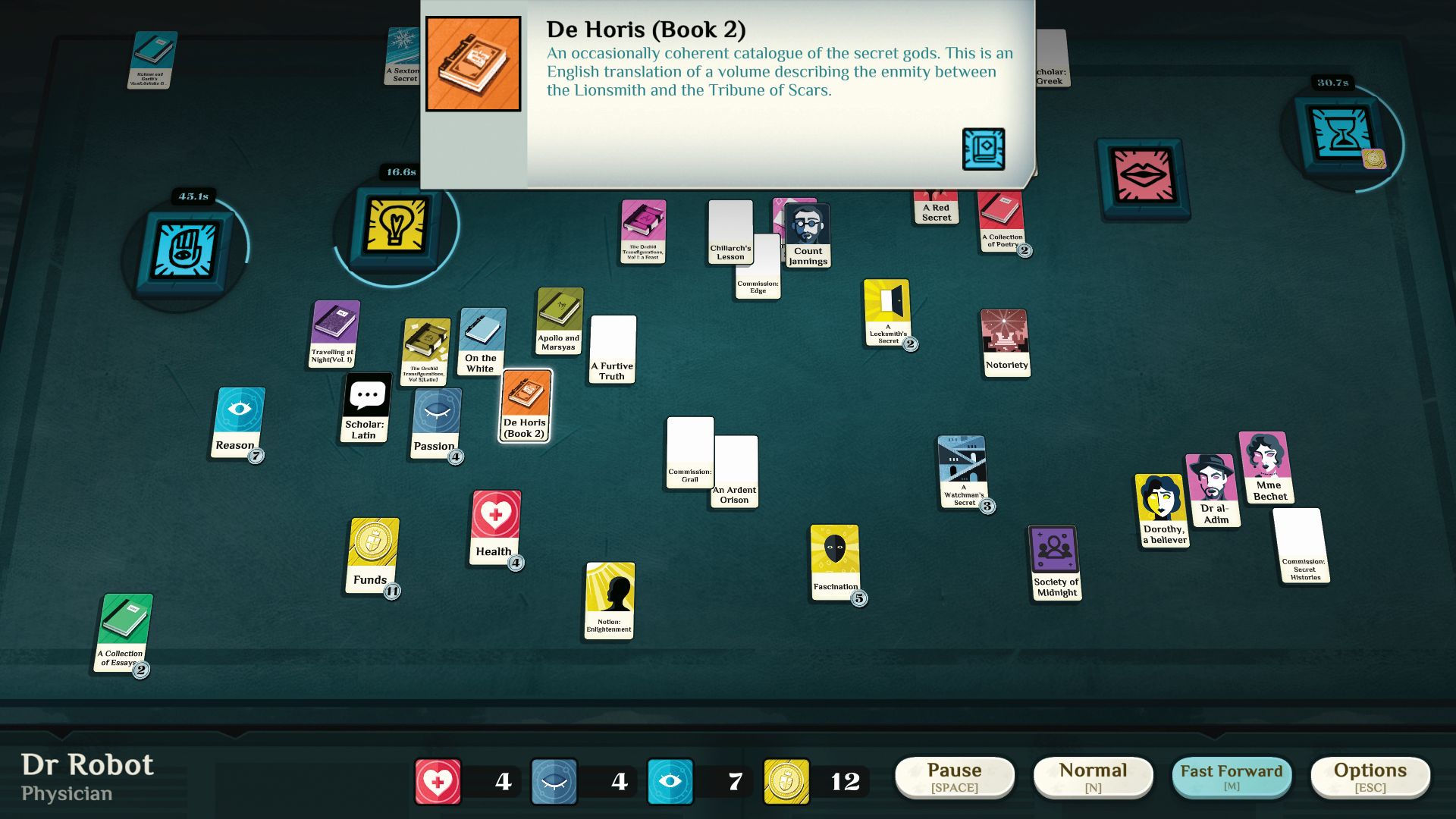
You start off with basic ingredients1cards and action timers spread out across a digital surface. They vary depending on the character you pick and when you trigger particular actions but you’ll always have the bare bones of a resource engine.
Starting as a physician, I had two Funds cards, one Health, one Reason and one Passion. In order to grow my deck and create the story, I started clicking on the actions and plugging cards into slots.
Putting a Passion card in the work slot meant my character started painting. That proved an unreliable source of income. Putting Health in the work slot resulted in manual labour—reliable funds but with a risk of injury. To keep my character safe I opted to use the Position at the Institute card to drip feed two Funds cards into my possession after a minute had elapsed.
Funds is what keeps your character alive because one of the action timers is Time Passes. It automatically draws in one Funds card every minute, representing your ability to keep the character alive. If you run out of Funds bad things start to happen. If that timer stays empty too long you’ll die and have to start over.
The biggest gaming news, reviews and hardware deals
Keep up to date with the most important stories and the best deals, as picked by the PC Gamer team.
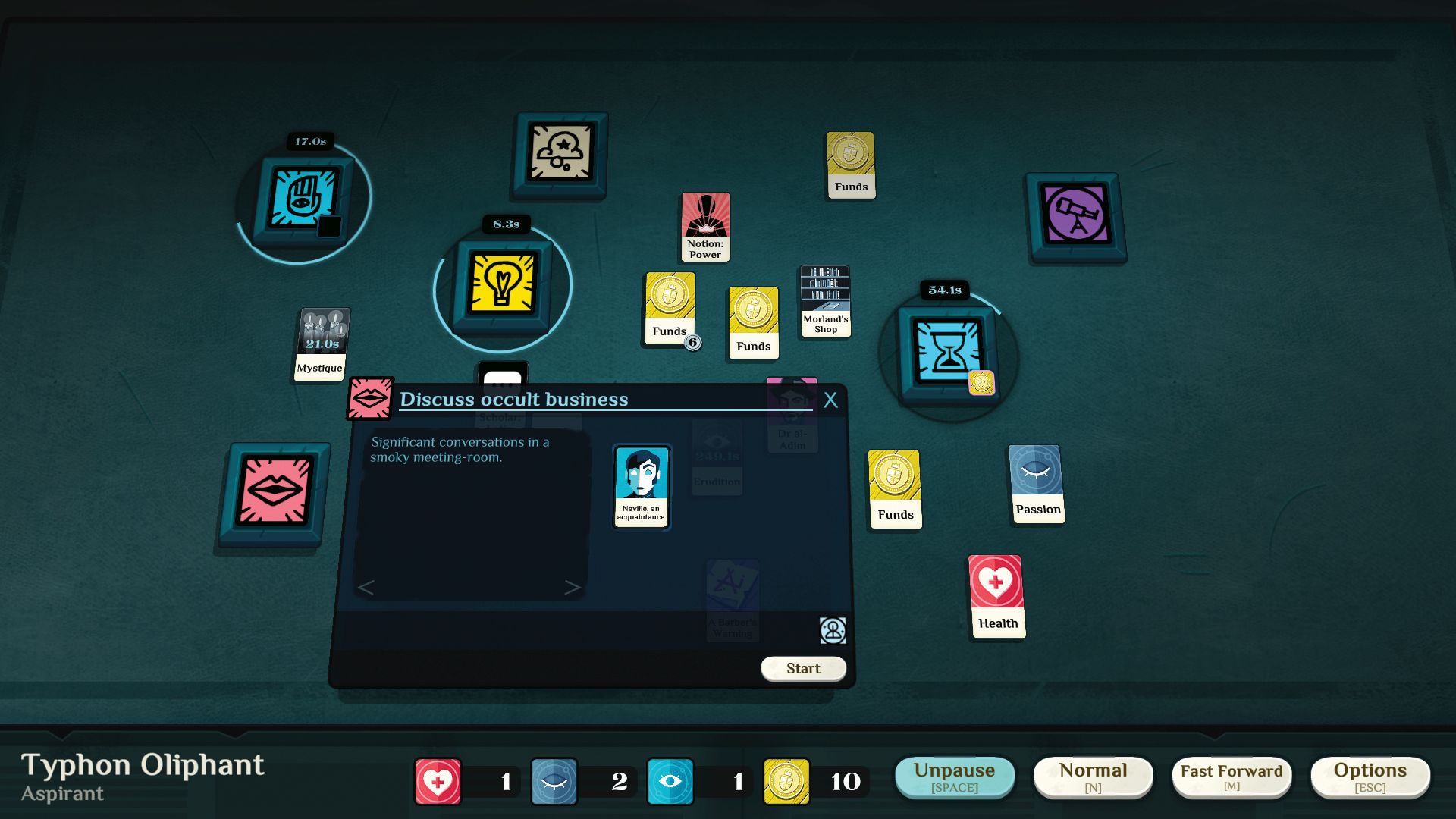
I ended up uncovering directions to a Bookshop by experimenting with the Explore timer. From there I could start acquiring a library of my own by combining the Bookshop with Funds. Book cards can be bunged into the Study timer to start divulging their secrets.
Only about a fifth of the content planned for the full release is in the game right now. As such, the Scholar’s Build has obvious limitations, but it does offer progression from those basic starter setups to far more complex interactions.
On the cards
For instance, I have a bunch of mysterious commissions I’m trying to figure out how to complete using a subset of cards which disintegrate after a while. I have accidentally started the Church of the Bright Edge while trying to work out what to do with the Society of Midnight. And I think I’ve bumbled my way through a couple of rituals, however I’m not entirely sure whether I completed them to the game’s satisfaction.
Two further themed builds are intended for Early Access players to tinker with before the game comes out. Bevan notes that these will be big content dumps – “One’ll focus on the traditional magus role (completing rituals, casting spells, summoning creatures from the squirming underbelly of the Nameless Void), another revolves around an explorer character, someone going into crypts and stealing artefacts and definitely not running into problems with arcane tomb guardians or anything like that, no sirree.”
The text portions of Cultist Simulator are smaller than those I recall from Sunless Sea. This project is recognisably from the same pen but is structured more around an accretion of narrative through a mixture of repetition and experimentation.
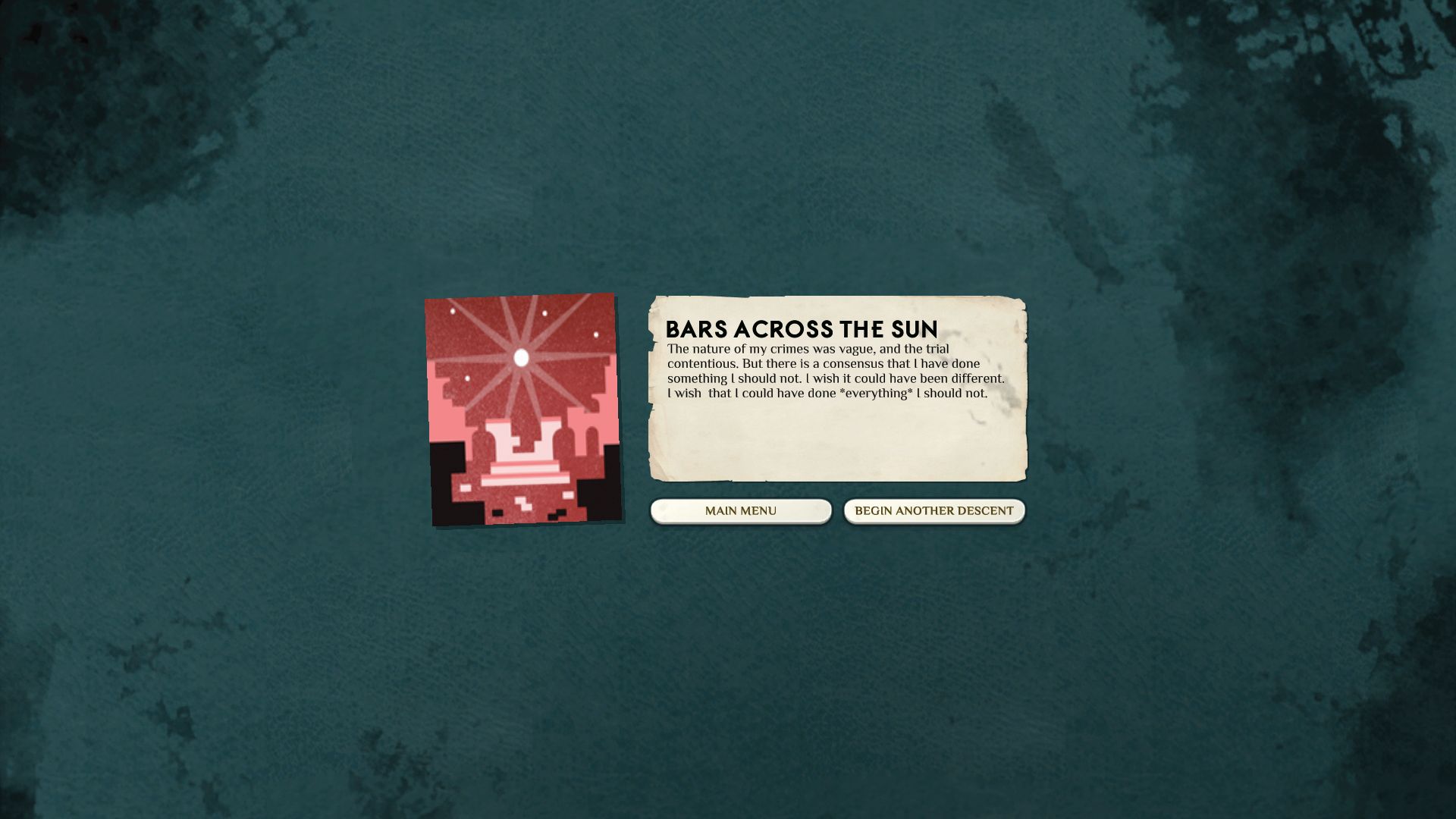
In Kennedy’s words, “Thematically, it’s the same inspirations and the same obsessions. It’s about 20% less full-on than the stuff I did at Failbetter—there’s a bit more melancholy and a bit less berserk black comedy—but it’s still the kind of game where people get set on fire.”
There’s a bit more melancholy and a bit less berserk black comedy—but it’s still the kind of game where people get set on fire.
Alexis Kennedy
He adds that although there are similar systems at play the goal is to enmesh the two. “Sunless Sea (and, as far as I know, Skies) have distinct game and story layers—you’re in the game, or you’re in the story, even though the two connect constantly. I wanted to dissolve that boundary, in the way that a good Ameritrash board game sometimes does.”
(The term ‘Ameritrash’ tends to mean board games which focus on theme, conflict and luck—stuff where you’ll roll a die or pick a token out of a bag to find out if you’re going to pummel something or not. Arkham Horror feels like an appropriate game to invoke here!)
Over a series of lives and restarts I gradually internalised how to acquire basic resource cards. That process was a pleasant accumulation of knowledge. Earning money feels more of a grind—good for creating the sense of keeping a day job to sustain your occult projects, but an irritant when it comes to repetitive clicking. I mentioned that I was prone to forgetting recipes to Kennedy and he hopes that as more content goes into the game that should be less of an issue.
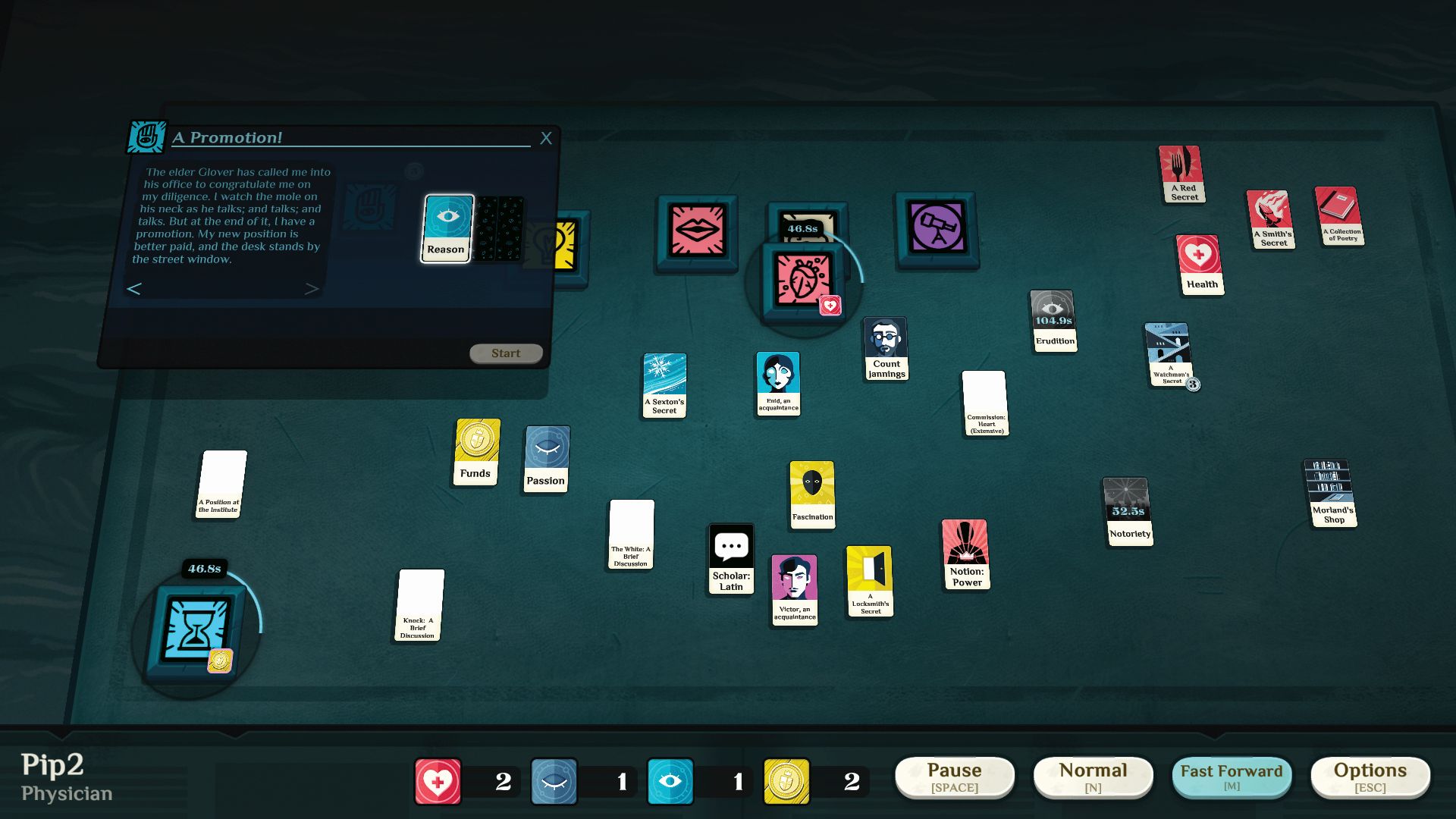
“I’m filling in the interactions as we go. It’s a mosaic where the outlines are in, but a lot of the pieces are still missing. So when you find a blank space—like, trying to combine Dream with Rumour, which might have an effect in the final game, but doesn’t now—you don’t learn anything, and you probably get frustrated besides.”
Another element, present in a fledgling form right now, is a legacy system. You can pick a physician role when you start afresh and get references to your previous character as a former patient. In the future the intention is to be able to earn unlocks for future game starts as you play.
“Once you’ve ended a game through Imprisonment, the Journalist and the Detective show up in your origin picks,” says Kennedy. “What I’d like to do, though I don’t know if it’ll make it in before May, is allow people to pick which objects carry through to the next game—which might include books their previous character has written, or tools they created.”
Eldritch inspiration
Interestingly, if you’ve followed Kennedy’s work over the years, Cultist Simulator is also the comfiest he has been with the Lovecraftian label. “I spent years resisting the Lovecraft label, because of course he’s a point of reference, but a lot of my stuff aims for playfulness, or even a sort of gallows optimism, and that’s not at all what Lovecraft does,” he explains. “I think Zelazny and Renault and Peake and Le Guin are bigger influences. I never wanted the tentacle on the gas-lamp on the Fallen London logo because I felt it skewed too Lovecraft—my art director and I argued about it for years, but it was such a good image that it stayed.
“But with Cultist Simulator, I just leaned into it. There are still differences, but the similarities and the influences are so obvious I’m just not going to even try to fight it. I feel a bit like Winston Smith reconciling himself to Big Brother at the end of 1984: I give up, I’m coming home.”
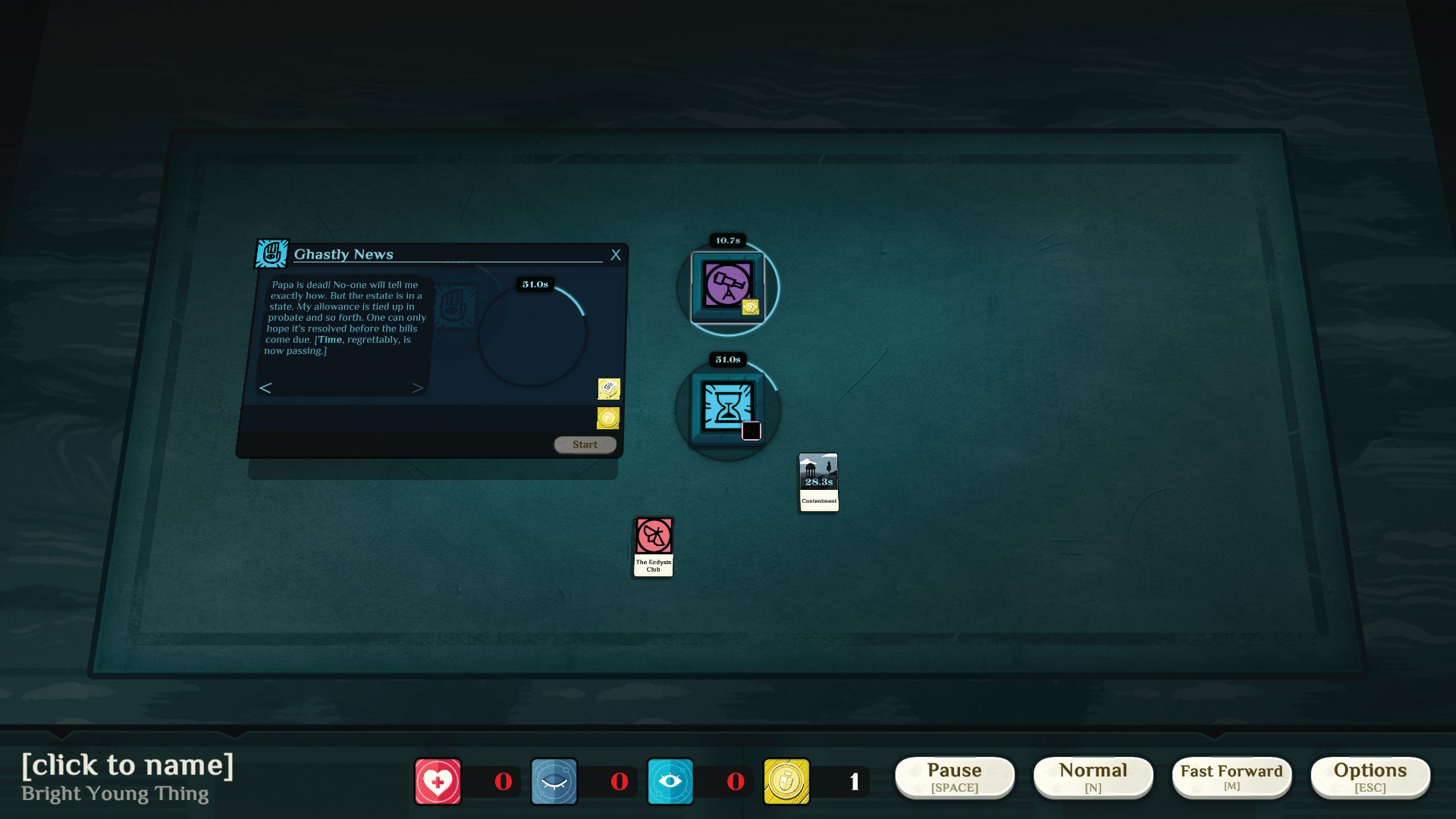
Bevan adds that, “Lovecraftian’s also a great touchstone for people new to the game: it conjures up appropriate images of weird fiction, shadowy grimoires, maladjusted intellectuals and gibbering horrors of non-Euclidean geometry flopping around outside your bedroom at night. All of which are a-okay by me.”
The full game is currently scheduled for a May 8 release. That won’t be the finish line for Cultist Simulator, though.
“It’s a living game,” confirms Kennedy. “We already have ideas for post-release content—an artist career, a romance pack, a renegade priest origin, a ghoul origin—but we want to make a solid core game and get it out the door first.
“The better the game does, the more resource we’ll commit, but if you’re an indie making unusual games, the wise thing is to plan for the long term. It took four years for Fallen London to turn a profit. But FL has been running for nearly ten years. I like building things that last.”

